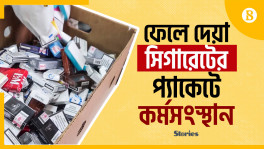Automated chlorination can reduce diarrhoeal diseases in slums: World Bank
The research team conducted a clustered randomised controlled trial in low-income communities based in Dhaka and Tongi

Adopting automated chlorination for shared water taps can reduce diarrhoeal diseases such as typhoid and cholera in urban slums, according to the World Bank's research.
Every year, such diseases kill approximately eight lakh children with no access to pure water in low-income countries.
The World Bank shared these findings in its paper titled "Bangladesh: Can Automated Chlorination at Shared Water Taps Reduce Disease in Urban Slums?"
To evaluate how an automated chlorination system would work, the World Bank research team conducted a clustered randomised controlled trial in low-income communities based in Dhaka and Tongi.
The team found the chlorination method significantly improved water quality and reduced incidents of diarrhoea in children.
According to UNICEF, only about 34.6 percent of people in Bangladesh have access to safe drinking water.
Around 99 million people in the country drink water that is contaminated with microbes – about 41.7 percent of water sources are contaminated with faecal bacteria.
In Dhaka, 20 percent of residents live inslum areas where safe drinking water is very rare. Often, sewage seeps into the water as the water system is not fully pressurised.
Before the research in the study area, 87 percent of the tap water was found to be contaminated with E. coli – a bacterium that can live in human intestines and cause diarrhoea – while 50 percent of taps near theTongi area contained faecal bacteria.
The research first selected 920 low-income households, covering 1,036 children aged below five. Later 100 shared water collection points were selected and the research subjects were divided into two groups – the treatment group, who received chlorine dispensers and the control group, who received vitamin C doses in water storage tanks.
After collecting data every two months for a total of 14 months, 7.5 percent of children in the treatment group experienced three bouts of diarrhoea. From the control group, 10 percent of children experienced three bouts.
This indicates that the children in the treatment group experienced a noticeable reduction in diarrheal disease due to use of a chlorine dispenser, the World Bank concluded.
Moreover, E. coli contamination reduced drastically in the treatment group to around 15 percent, while reduction in the control group stood at 64 percent
Additionally, treatment groups spent around $1.35 less money on illness-related expenditures.
During the research, the chlorine dispenser was not commercially introduced. However, the estimated selling price was $20 and the refill price would be $25 per dispenser.
With installation, maintenance and communication, the total cost would be $3.62 (or Tk306) per household.


 Keep updated, follow The Business Standard's Google news channel
Keep updated, follow The Business Standard's Google news channel
















